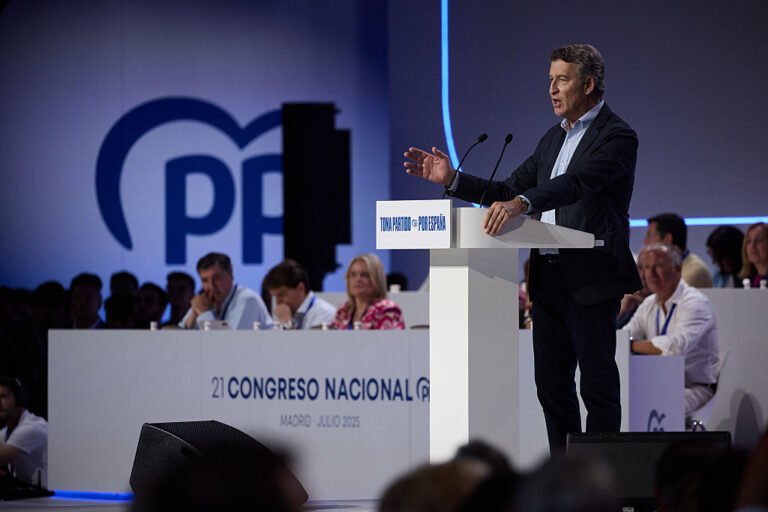Spain’s main opposition leader has confirmed he is ready to work with the far-right party Vox. Alberto Núñez Feijóo, head of the centre-right People’s Party (PP), made the statement during the PP’s recent party congress in Madrid.
Feijóo was re-elected as party leader with nearly 100% of the vote at the two-day gathering. During his speech, he said that PP voters and those of Vox should all be respected. He made it clear that he would not support isolating Vox from future talks on forming a government.
Feijóo explained that his party would not apply a “cordon sanitaire” to Vox, which means refusing all cooperation. Vox is now the third-largest political party in the country. It is also a member of the “Patriots for Europe” group in the European Parliament. The PP leader stressed that ignoring Vox voters is not something he is willing to do.
Feijóo added that, while cooperation with Vox is possible, his party does have clear limits. According to him, there are only two major red lines for the PP. The first is EH Bildu, a Basque party some associate with the former ETA group. The second is the current leadership of the ruling Socialist Party (PSOE).
Feijóo said the PP would only speak to EH Bildu if it publicly apologizes to the victims of ETA violence. More than 850 people died due to attacks by ETA. He also said EH Bildu must help explain what happened during those years. Without these steps, he believes talks with that party are impossible.
The statement comes as Spain’s political climate becomes more divided. The current Socialist-led government is under pressure due to recent corruption cases and a party scandal. These events have boosted support for the PP. However, polls show that the party may not gain enough votes to govern alone.
While the next general election is set for 2027, public anger over the recent scandals has led to growing calls for early elections. Prime Minister Pedro Sánchez has not given in to these demands yet. But the situation remains tense.
In this context, a possible PP-Vox partnership could become necessary. The two parties already share power in several local and regional governments across Spain. However, they differ on several key topics. One of the most sensitive issues is immigration.
Vox has often criticized the PP for what it sees as weak immigration policies. Vox has called for stricter border controls and tougher action against illegal migration. The PP, on the other hand, supports rules that are seen as more moderate and in line with EU standards. This gap could cause friction if the two parties were to work together at the national level.
Still, Feijóo’s remarks show that he is keeping the door open to cooperation. His focus appears to be on broadening support and making his party a central player in future talks.
Feijóo also reminded his supporters that change in Spain will not happen overnight. He believes the PP must earn the public’s trust step by step. He also said that his party offers a better and more stable alternative to the current government.
The possibility of a centre-right and far-right coalition is likely to remain a hot topic in Spain’s politics. With ongoing scandals and public pressure, the coming months could shape the political future of the country. Whether a PP-Vox alliance becomes the path forward may depend on how both parties handle their differences.







